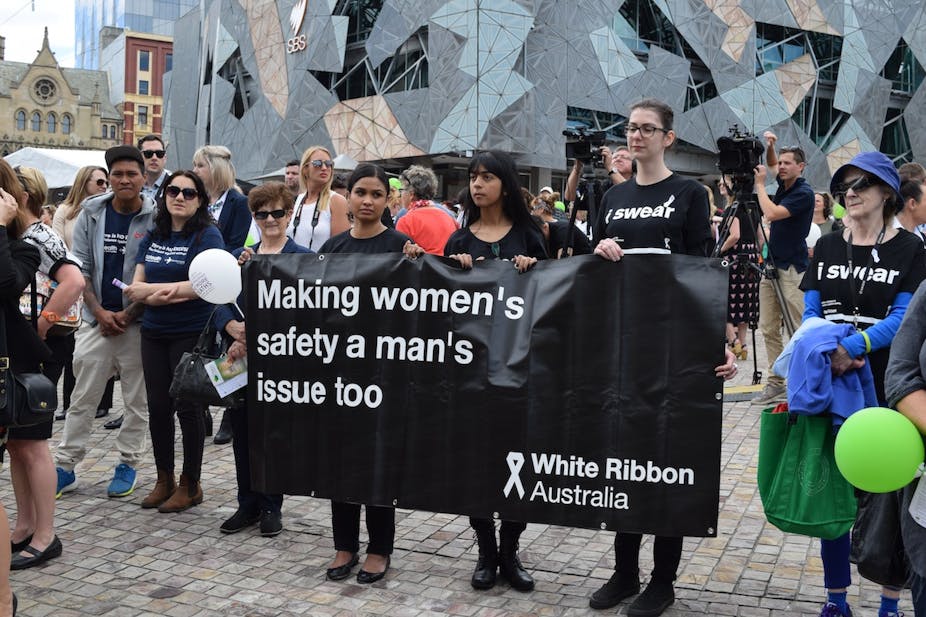This week “feminist” organisation White Ribbon came into disrepute after one of its ambassadors, psychiatrist and journalist Tanveer Ahmed, wrote an opinion piece in The Australian, suggesting men’s violence against women could be attributed to the historic decline of men’s power. This decline, felt acutely by working class and recently arrived immigrant men, has been exacerbated by the decline in secure unionised employment. Men have become “feminised” and are, as a consequence, “humiliated”. It is this, he argues, that is “increasingly the driver of family-based violence”.
Ahmed says “statistics don’t lie” – one woman a week is killed by her current or former partner – but the “old argument” about men’s power no longer applies. In fact, says Ahmed, violence by men is increasingly perpetrated because they are powerless, not powerful.
While masquerading as analysis, the piece ultimately reads as an apology for men’s violence. There are two reasons for this. First, Ahmed’s “diagnosis” is not followed with a recognition that men’s (likely very real) problems with declining power are theirs to work through, not to enact on their wives, girlfriends or other women in the form of violence. Second, he criticises, in the most stereotyped and deliberately inflammatory terms, the feminist movement, which gave the very tools and resources to make such a critique of male violence possible.
Feminism forgotten
One of the difficulties with this view is that it both exploits yet (unreasonably) dispenses with feminist analysis. In this sense, Ahmed doesn’t acknowledge his debt – both theoretical and practical – which makes it harder to do the work that White Ribbon is ultimately all about.
Indeed, the very paradigm he caricatures as out of touch – “1970s radical feminism” - was the movement that put men’s violence on the agenda and defined it as a systemic issue rather than as a series of inexplicable, isolated cases. It was the second wave of feminism – although certainly men’s violence was recognised in the first wave and earlier too – that recognised that this problem was the outcome of unjust power relations. This was a critical step in our understanding of the problem, which, sadly, remains as relevant today as it was in the heady days of the consciousness-raising 1970s.
White Ribbon have since made an official statement rejecting Ahmed’s views. CEO Libby Davies said they were “shocked” by Ahmed’s article and that it “absolutely exemplifies some of the issue around men fully understanding violence against women … when a supposedly educated person makes gross misjudgements around the issue of feminism, equity and equality”.
In my view what makes Ahmed’s critique especially complex is that he is, in some important respects, right. Men are losing power in a world where women have gained formal equality. Ahmed is certainly not the first to suggest that some are “evening the score”, in crude terms, in their private lives. An analogous argument has been made by “radical feminists” regarding the exponential rise of the global sex industry.
Where Ahmed falls drastically short is in naming that the power being lost was not a legitimate power in the first place – any more than whites having power over blacks or gay couples not being “allowed” to marry was legitimate. This unearned privilege was and is part of a system of social, political and economic control that feminism as a movement for women’s equality has sought to name, critique and dismantle.
Rhetoric of equality
Moreover, it is false to assume that the rhetoric of women’s equality is a reality. Ahmed points out “women are more likely than ever to enter university, be breadwinners, or have affairs”. Without qualifying these statements, they misrepresent the evidence.
While western women have made substantial gains in their youth and are indeed more likely “than ever” to be awarded a university degree (with the notable exception of an engineering degree), in fact most women end up considerably poorer than most men in their socio-economic group. The simple reason for this is that women undertake the vast majority of unpaid care work and tailor their working lives accordingly. Research consensus shows it is still incredibly difficult to “juggle” these roles and most women’s careers or, more to the point, lack thereof, reflect this.
Economic reality
Women are not just as likely to “be breadwinners”. In fact they are highly unlikely to be the primary earners of their families unless they are single mothers. And then their primary earnings are likely to be a poverty-line conglomerate of welfare and the meagre earnings of part-time and/or casualised service work - the very work that Ahmed suggests is leading men to become violent!
Once they have children, the great majority of women work part-time and their earnings are supplementary to the primary breadwinner’s; that is, to the man’s earnings.
Ahmed mistakes the rhetoric of empowerment for a utopian reality that has not yet arrived. Indeed, one of the reasons women have difficulty leaving domestic violence situations is precisely because of their economic dependence on men.
In the ensuing debate, Ahmed has promulgated himself as a moderate rationalist who merely wants to temper and enrich the debate. However, he simultaneously undermines the platform upon which this debate rests: feminism.
Predictably, feminist responses have been dismissed as “hysterical” and lacking the reason and insight that Ahmed, as a man and a doctor, has a purported monopoly on. Feeding into the very stereotypes about feminism and by implication women that are most damaging, Ahmed has done a great disservice to the White Ribbon cause.

